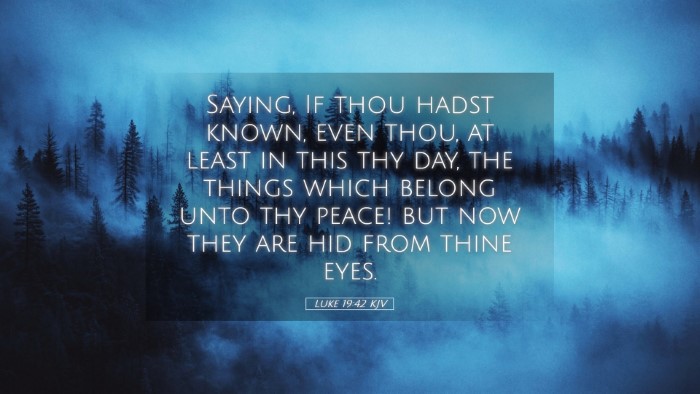Commentary on Luke 19:42
Bible Verse: "Saying, 'If thou hadst known, even thou, at least in this thy day, the things which belong unto thy peace! but now they are hid from thine eyes.'" (KJV)
Contextual Overview
The passage in Luke 19:42 occurs during a pivotal moment in the life of Jesus as He approaches Jerusalem. After His triumphant entry, where the people acclaimed Him as the Messiah, He pauses to lament over the city. Understanding the rich history of Israel's relationship with God is essential to grasping the weight of His words here.
Thematic Insights
- Day of Visitation: This "day" refers to the divine revelation and opportunity for peace that Jesus brings which the city fails to recognize.
- Hidden Truth: The statement God makes regarding these truths being "hid from thine eyes" has profound implications for understanding spiritual blindness.
Commentary Synthesis
Matthew Henry's Insights
Matthew Henry emphasizes the grief Jesus shows over Jerusalem's impending destruction. He notes that Jesus weeps for those who do not perceive their own peril and for the missed opportunity of salvation. Henry remarks that this passage reveals Christ's compassion and His role as a prophet mourning over a city that has turned away from God. He strengthens the observation that the people did not discern the time of their visitation, highlighting the consequences of failing to respond to divine opportunities.
Albert Barnes' Analysis
Albert Barnes elaborates on the phrase "the things which belong unto thy peace." He interprets this as referring to the salvation that Christ offers, which is deeply connected to the kingdom of God. Barnes points out that the rejection of this peace leads to vulnerability and destruction, marking a clear warning to those who resist divine grace. He further comments on the implications of spiritual blindness, suggesting that it often results from a persistent rejection of God’s truth, which can ultimately seal a person's fate.
Adam Clarke's Observations
Adam Clarke brings a deeper theological perspective to this lament. He talks about Jesus’ prophetic role, noting how His sorrow is both for Jerusalem and a reflection of the larger human condition—our tendency to overlook and misinterpret the signs and opportunities presented by God. Clarke posits that Jesus’ lamentation is a warning for all generations, urging believers to recognize God's active presence within their lives and respond appropriately to His call for peace and reconciliation.
Theological Implications
This verse prompts deeper reflection about the nature of God’s revelation and human response. It underscores several important theological concepts:
- Human Responsibility: Each individual is called to recognize and respond to God's revelation in their lives, as seen in the lament of Christ over Jerusalem.
- Divine Compassion: Jesus demonstrates deep compassion for humanity, highlighting God's desire for reconciliation and peace for His people.
- Judgment and Mercy: The passage highlights the tension between divine mercy available through Christ and the eventual judgment that follows a rejection of that mercy.
Practical Application
For pastors, theologians, and Bible scholars, Luke 19:42 serves as a profound reminder of the necessity of vigilance in faith and openness to God’s guidance. Effective preaching and teaching should encourage the recognition of God's presence and urgency in the present moment. It calls believers to not only acknowledge the historic reality of Christ’s salvation but to live in expectation of His ongoing work within the world and in their personal lives.
Moreover, this passage serves as a poignant reminder to confront spiritual complacency, encouraging congregations to reflect on their own responsiveness to God’s challenges and invitations. The fruit of acknowledging our state can lead toward renewal and a deeper experience of God’s peace, highlighting the transformative power of recognizing Jesus as the source of true peace in our present-day contexts.


